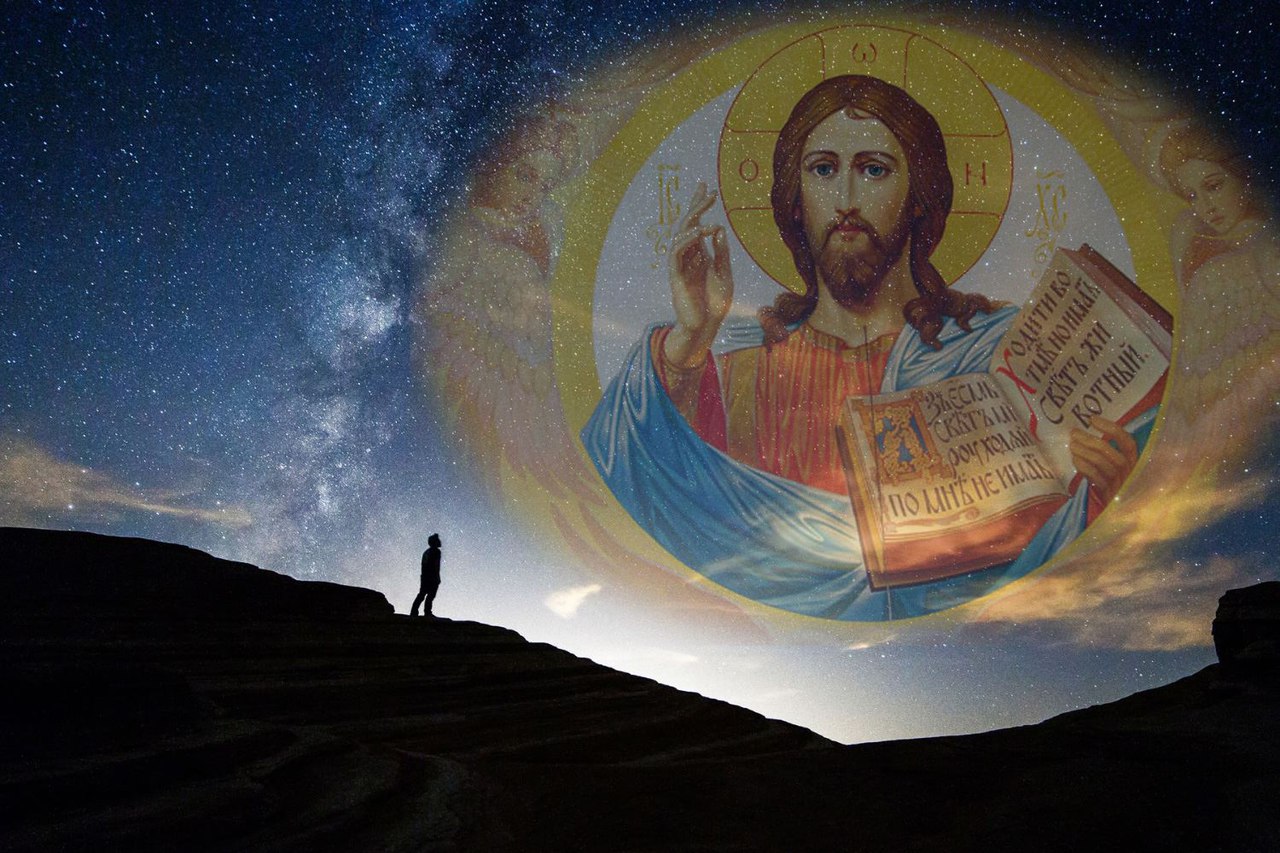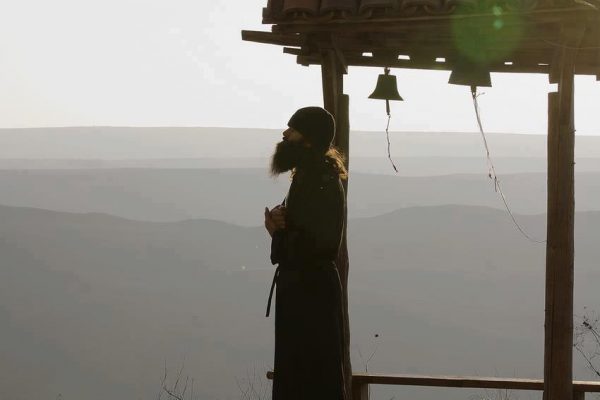A writer of the nineteenth century has said: “Prayer is about things which never happen and is addressed to one who never answers”. If we put the accent on receiving immediately what we ask for and in the form in which we desire it, this definition very often comes true. If what we wish is a tangible experience of closeness in the presence of God we may well discover that He remains silent.
But prayer begins at that very point when we turn God-wards bringing not so much our needs as the longing of our hearts and of our whole being and when we go round in life crying “Where art Thou, my lover and my master? Where art Thou, why dost Thou hide Thy face from me, I cannot live without Thee.” This begins at a moment of enlightenment at moments of depth when we suddenly discover — either when we are very young and our mind is still clear and our heart is translucent or later when both have been tested and worn and tired — when we discover that at the core of our being there is a depth, a sacred realm which nothing can either fill or satisfy or fulfill, whatever we glean from the earth or whatever we receive from the created world. Prayer begins at the moment when we suddenly discover what the Archbishop of Canterbury once called “a God-shaped emptiness in the depth of our soul” or, to use other terms taken from the Book of Revelation, when we discover that at the core of our being there is a place where only God has access and that we have at the very depth of ourselves a sacred realm which belongs to God and to us. And the relationship with God which is unique and unrepeatable, that opens up on infinity and eternity, with nothing finite or temporal can fill us to the brim and give us a sense of completeness. Prayer begins there at the moment of discovery that the hunger cannot be satisfied with anything that the earth can give; and when turning to him whom at times we do not know yet, we cry and moan: “Where art Thou? Why doth Thou hide thyself from me? Oh do not leave me alone forever”. These words are not taken from sacred literature. This is a cry of a woman abandoned by her husband in one of the most beautiful tales of mankind, that of Nahla and Demayanti, that belongs to Indian literature. This woman called him her master and her love.
At that moment our prayer already has acquired a shape. We have words by which we can address Him whom we cannot yet name in any way. He is no longer the huger of our soul and the pain of emptiness and the anguish of loneliness. He is the beloved one without whom I cannot live. He has become Thou — the only one whom we call Thou. And again, when we have discovered that he is the only one who responds to this cry of our soul so familiar, so tender and so unique, then prayer will become articulate and possible; possible as an achievement, possible as a relationship established and alive when we turn to him and say “How shall I call Thee?” Isn’t this what happens in human relationships when out of the crowd we single out one person who will now be the beloved, one who will transform for us all relationships because once we have discovered the beloved one we are no longer surrounded by men and women. There is he and there are people; and later we turn to him and her and we will ask “How shall I call you?” It doesn’t mean at all “what is the name by which you are known? What is the best way of calling or defining you?”, it is a search for such a name that will be the sign and the mark of a unique relationship and that will signify all there is between us.

Photo: http://foma.ru/
In the Book of Revelation there is a passage in which we are told that in the kingdom everyone will have from God a white stone with a name written on it which no one knows but God himself and he who receives it; a name which cannot be used by anyone else because it defines the uniqueness of an unrepeatable, incomparable relationship. If we want to pray from our hearts and our minds and from all our being we must search for that name and that word which establishes between God and us the relationship which, as we perceive him now, is ours. Look at the Psalms and you will see the richness of these names. But it is seldom the Almighty, the Creator which we will single out. Isn’t it more striking when we read a psalm or sing a song which proceeds with dignity, harmoniously and in a lofty way to see of a sudden it interrupted with an exclamation in our text between two commas, two words so unexpected, “Oh thou, my joy”. This is the moment when a pious exercise may become for us as it became for the psalmist a cry out of the heart that expresses all he knows about God and all that God is to him. “Oh thou, my joy”. This is the way in which me speak to each other when we love someone and when it is no longer names, certainly not surnames but a warm nickname or a unexpected cry that comes out of our hearts. Today is Pentecost, the day when the Spirit came to dwell not only in the total Church but to unite himself to each human soul, to make out of each of us a living temple of the Holy Spirit. What does he teach us about prayer? In what ways is he directing us?
I would like to remind you of two ways in which we are told by Scripture the Spirit teaches us to pray. First there are the unutterable, ineffable groanings which all creation including us brings forth to God; this inarticulate cry, this longing which has no shape yet but which means “Where art thou, O my lover and my master? where art thou, why dost thou hide thy sacred face from me?” And then the Spirit which is the Spirit of truth and which leads us into all truth, the spirit of Christ and the spirit of sonship, he expresses in an articulate way what we have got to say: “Abba, Father”. These are the final words which do not link us only in an emotional way with our Creator but disclose to us and are an expression of the discovery made by us that by the power of the Spirit, by the mystery of uniting and atoning love, we have been made one with Him who is the only begotten Son and also made through Him and in Him. And these are the daring words of St Irenaeus of Lyon “made in him who is the only begotten Son”. At that depth we discover that our prayer is linked with Christ and with the Spirit. It is linked with Christ because it is only in him that we can speak to the God of heaven as our Father; and we do this not only in relational terms, but deeper than simple moral relations, we do it in terms of true being. This means that if our prayer is to be rooted in Christ every prayer of our must be such that Christ would be able to utter it or, if you prefer, should be such as to be the articulation in the present situation of what Christ would have said if he had been in the flesh in our place.
And that applies to social tension, to political tragedies, to family relationships, to friendship and hatred, to all the complexity of private and communal life. If we want to pray as Christian our prayer must be that of the Son of God become the Son of Man. And this we can do if we listen to what the Spirit speaks to the churches; to the churches at large but also to those small mysterious temples, temples which are our souls and our bodies and our spirits (because the word church comes from a Greek word that means God’s realm). It teaches us to call the God of heaven Father, he is the one who leads us to all truth, but he is also the one who claims from us a life that will not give the lie to the words of our prayer.
We are called by the Gospel, by the very words of Christ himself to pray in the Spirit and in truth. What does this prayer of truth mean? It means that our words must be an expression of our life, our concern, our commitment, our solidarity, both simultaneously and equally with God and with man. It means that our life must be evidence that the words of our prayer are not a lie. This is why so often our prayers are weak and unconvincing. They don’t convince even ourselves, because while we pray for a thing to happen or to be, something in us says ”Let it not happen and let it not be”. You remember in the Confession of st Augustin how he speaks about his early prayer. He said that he prayed for chastity and added, “yet not just now”. Isn’t it that do this continuously — “not just now”. “Help me, O God, not just now”; “Give me strength” — no: “do it instead of me”. Isn’t that what we continuously do when we ask God for help t overcome what is evil and to achieve what is good? Don’t we expect God to do instead of us what we perfectly well can do in his strength? Don’t we continuously defeat our own prayers because having asked God to help us do things we don’t do them? It allows as to charge God with idleness and carelessness and to be free from responsibility. Isn’t that also what we do when we intercede for the needs of the world? How much we intercede, how many needs are remembered in our churches! And yet how little do we do about it. Isn’t so often our intersession a polite way of telling God, “O Lord, I have noticed some disorder in your world, couldn’t you do something about it”. And how seldom do we turn to God and say “Lord, I lave for a sudden become aware of what has brought you to the Cross, and what has killed you; and 1 can’t enjoy it anymore. Make me an instrument of thy will”.

Photo: https://vk.com/kazeparhia
The prophet heard the Lord say “Whom shall I send?” and he said “Here am I”. Are we often ready when we have heard the call of God to say “Here am 1″? Aren’t we satisfied with our intercession? Don’t we realise that to intercede does not mean to remind God of his shortcomings but consists in taking a step that will bring us in an act of solidarity to the heart of the conflict, saying to God “I will stay there until I die or until the conflict is resolved. I’ll stay there to be thy presence and I will stay there to be the witness of this human torment and suffering and anguish.” Don’t we realise that intercession means the duel, bipolar solidarity of the Incarnation in which Christ simultaneously and equally was the Son of God and the Son of Man, condemned to die because He stood at the point where the tension broke into murder or into condemnation or into atonement? This is the implication of what Christ says to us when he commands us without any option for us to choose to pray in truth with all our body, and with all our soul, putting our body where it can serve the purpose which our prayer is meant to serve, and our soul at the breaking point, where the judgment and the crisis is maximum.
Think of these few things and you will see that you will have to begin in your search for God not by testing his ability to respond to your prayers, not by testing his ability to make himself perceptive and tangible, but at the other end of the spectrum, at the point where you will discover that without him you cannot live and without him you can do nothing. Then you will discover that you are too deep, too great for all things created. Then you will be able to turn to him and say “Where art thou, my love and my master?” and then, if you pursue this search, not waiting for tangible proofs but putting your hand to the plough, doing and praying, you will find the name of God that sums up your relationship and from name to name you will become such as will be able to call Him Father. You will be able to take, in this world of ours, the place where the Son stands — the one who in total solidarity with God in oneness with him, and in total solidarity with man in oneness with man, took his stand, ready to make his prayer not only a word of a cry but life and if necessary death, the death of Love. Amen.




















